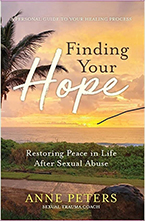September 13, 2022
Finding Your Hope:
Restoring Peace in Life After Sexual Abuse
Anne Peters
Aviva Publishing (2021)
ISBN: 978-1636181592
New Book Brings Hope and Peace to Sexual Abuse Survivors
 In Finding Your Hope: Restoring Peace in Life After Sexual Abuse, Anne Peters shares advice and processes for overcoming sexual abuse so you can live a normal and happy life. Peters, herself a victim of sexual abuse, tells her own story and that of others to inspire readers to know that a better life exists and that the pain of sexual abuse can be healed.
In Finding Your Hope: Restoring Peace in Life After Sexual Abuse, Anne Peters shares advice and processes for overcoming sexual abuse so you can live a normal and happy life. Peters, herself a victim of sexual abuse, tells her own story and that of others to inspire readers to know that a better life exists and that the pain of sexual abuse can be healed.
Peters offers a healing plan that is presented in the book in fifteen chapters, each chapter a step of that plan. Topics or steps include: Understanding What Happened to You, Locating Helpful Resources, Knowing It Is Not Your Fault, Embracing Your Inner Child, Releasing Your Emotions, and Achieving Happiness. The chapters are short to make them easier to read and also because Peters knows this process can feel scary and overwhelming, so she wants readers to bite off a little at a time so they feel comfortable and can cope with any emotions that come up during the process. She lets readers know they should work at their own pace and can skip around in the chapters, reread them as needed, and do the exercises offered at the end of each chapter on their own timeline.The process begins with “Understanding What Happened to You.” Peters was sexually abused as a child so she walks readers through how sexual predators manipulate children through grooming them—such as by showing them porn, promising them rewards, or filling a void of loneliness—to get them to engage in sexual activities, and then the predators try to control them by threatening to tell on them and warning them that they are just as much at fault because they also partook in the sexual behavior.
The chapters that follow focus on locating resources, deciding on whether to go to counselors or therapists and how to find the right ones, and coming to understand that the abuse was not your fault. Peters shows how to build up a support network and create an environment for yourself in which healing can occur. She helps readers figure out how to find the time to heal, and whether they should take medication, as well as introducing meditation as a healing tool. Later chapters even discuss how to use art therapy and music therapy to help with expressing emotions and healing.
One of the book’s most powerful and difficult chapters is about forgiving your abusers. Peters explains that the forgiveness is for the person who was abused, and that forgiveness doesn’t mean forgetting. She also gives advice on how to initiate the forgiveness process, how to confront your abuser, and what to be prepared for, such as potential backlash from family members who may want to deny or minimize that the abuse occurred. She also discusses the value of seeking spirituality during this time to help you through the forgiving and healing process.
Ultimately, the goal is healing, so Peters offers ways to cope with the past, change your thought patterns around the abuse, and overcome any feelings of low self-esteem or guilt the abuse may have created. Positive mantras are offered to help with the process as well as numerous exercises throughout the book and inspirational tales of how others went from being abused to leaving their abusers and finally empowering themselves to lead healthy, successful lives.
Altogether, Finding Your Hope is a short and concise book but a powerful tool for beginning your healing journey. It allows you to overcome your abuse step by step in a way that is less scary than affirming, and it also provides a chance to mark your progress and celebrate your success. Once you begin the journey to finding your hope, you won’t want to turn back because you’ll be able to leave the past behind and redefine yourself on your own terms.
For more information about Anne Peters and Finding Your Hope, visit www.FindingYourHope.com.
— Tyler R. Tichelaar, PhD and award-winning author of Narrow Lives and The Best Place

